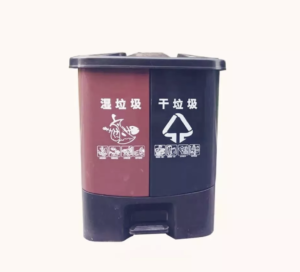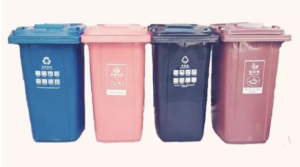In order to protect the earth’s environment and safeguard its own interests, China implemented a large-scale garbage classification and recycling policy since 2019. Taking Shanghai as an example, starting from July 1, 2019, they divided garbage into recyclable garbage, hazardous garbage, dry garbage and wet garbage. The government uses apps and QR codes to scan citizens’ garbage. Those who fail to sort will receive a corresponding amount of fine, in contrast, those who do well will receive a corresponding amount of bonus.
With relatively sound policies, recycling in Shanghai seems to be doing well. However, when I asked my friends at a college in Shanghai whether they would sort their rubbish according to the rules in college. The answer I got was, “We stopped sorting garbage a long time ago.”
In my mind, college students are always the first team to accept new knowledge and new things. Most young people today are much more environmentally conscious than other age groups. What is the reason to let everything rushed in front of the college students passive work? I’ll take a closer look.
In the investigation, I found that this college is not doing nothing. In the article on the campus public website provided by my friend, I found that this college has set up 8 recycling stations on the campus (as shown in figure 1). Each recycling station also has an intelligent self-service recycling machine (as shown in figure 2). These smart self-service recycling machines can help college students sort garbage, and college students can exchange their recyclables for money.
 (figure 1)
(figure 1) (figure 2)
(figure 2)
In the students’ dormitory, the school has set up the dry and wet garbage bins (as shown in figure 3), so that students can directly classify the garbage in the dormitory life. After the students have simply sorted the garbage in the dormitory, they then sorted the garbage and threw it into the garbage bin marked with recyclable garbage, hazardous garbage, dry garbage and wet garbage (as shown in figure 4). If the steps are so simple, why did the university’s students stop sorting garbage?
 (figure 3)
(figure 3)
 (figure 4)
(figure 4)
Through further chatting with my friend, I got the truth. In the eight garbage collection stations set up by the school, the garbage sorting is done very well. However, the classification of the four large trash cans that are most commonly used outside each dormitory building is not good. At first, the students and the faculty were serious about sorting the garbage. Later, they found that the university’s disposal of the garbage they had already sorted was very bad. This made them feel that even if they took the time to sort the garbage, it would end up mixed up when it was taken away by the garbage truck. Gradually, they are no longer active in garbage classification. My friend also emphasized that people are still unfamiliar with the classification of garbage, and dry garbage and wet garbage are often confused.
Overall, the implementation of Shanghai’s garbage classification policy has not been particularly successful. From this case, we can see that people’s lack of knowledge of garbage classification and the school’s lack of a unified recycling system lead to the slow failure of garbage classification. Therefore, I think the garbage classification policy in Shanghai is still not mature enough, and the Shanghai government should further change the garbage classification policy in view of this problem.

This blog is very interesting and educational. I like how you explained the garage and recycling system used in Shanghai in order to compare it back to the systems that we have here. I did not know what our school has been doing or that they were doing anything to help this cause. It is very good to find out that the school is doing something to help and support the issue at hand. I also liked how you used images in the blog to change it up and make it both reading and viewing in order to get a better idea. Overall, this blog was very well written and informational.
I genuinely enjoyed reading this blog. The idea of recycling, especially on college campuses in Shanghai has so much to do with us (“the college students”). There was a brief overview in the beginning then the story got personal when she mentioned a friend. We all want our efforts to seem like they matter. It breaks my heart knowing even when college students were sorting their trash, in the end it still was mixed up. Towards the end what does she mean by “Shanghai is still not mature” and how can “Shanghai government further change the garbage classification policy”? Be specific. However, I did appreciate how the blog was geared to a specific subject instead of an anecdote on climate change or environmentalism.
This was a very interesting blog post to read about because it tackled a real-life situation from a first-hand perspective and it was specific to something that is going on right now. I love how you asked your friends in China for clarification on why the garbage sorting has not been successful. In addition, I was shocked when you wrote about how the college students lost their hope in the sorting because they thought the garbage would still get mixed up. Lastly, the images that you provided helped me understand the entire situation better because they provided the context that I would not have had otherwise.
I think this post was super unique and I had no idea about this initiative in China so it was very interesting for me to read about it. I think it works especially well since you have a personal connection to it with people you know living there and being a part of it. It showed how policies that seem like a really good idea in theory can actually not go well at all which is hard for a lot of people to think about.
This blog is really interesting. I like the very educated and close up look into an important issue. I knew China had a garbage problem. I thought obviously their response to it would be massive and effective. Then, you brought in a real perspective of students in Shanghai and they pulled back the curtain on the real issue. The ‘higher-ups’ of the university are not enforcing the rules of recycling because they have that power. I think it is a common theme that institutions, like colleges, universities, corporations, can override the need for environmental reform. I think it is really important to look at important case studies like this one. Thank you!
I agree with you that Shanghai’s waste classification policy is not yet complete, and the main reason may be that people lack knowledge about waste classification. I live in Shanghai, and I found that although the trash bins in the community are sorted, my mom often throws the wrong trash bins, because she hasn’t learned the knowledge about garbage sorting. Therefore, popularizing people’s garbage classification knowledge can help the garbage classification policy better implemented.
I really liked reading your blog. It is true that is different parts of China has been affected with loads of pollution. That pollution also affects many other countries as well. Shanghai is probably one of the most developed cities in China and their economy is very successful. However, their policies on the environment is definitely somewhat horrible. Also, many people are confused on categorizing their garbage. Until right now, I did not know about the new recycling and garbage policy that you have talked about. It seems like a pretty good system to sort the garbage in order to lose or gain money. It seems like a system that would encourage people to sort the trash more.
I found this article very interesting. I was not aware of the policy put into place in 2019 to encourage garbage sorting. Schools all over the world should take note of these actions and attempt this program themselves. I found the addition of images helped create the image of how exactly the sorted bins would look. This post made me think more about how I sort my trash and what I can do better.
It’s very upsetting to see these garbage sorting policies put in place only to be put in landfills regardless of sorting. In the United States there was a large push for ‘three bin recycling’ for paper, plastic, and metal a couple years back even though most districts did not have the garbage disposal facilities/transport capable of doing anything with the sorted materials besides throwing them in a landfill. A lot of these policies operate under the justification of building habits for when efficient recycling/waste disposal is possible but it could also be seen as tricking the public.
I found your article to be both very intriguing and scary that institutions still take the easy route in their waste management even after brand new ideas are put in place. I think that in a lot of places governments and cities do not put enough enforcement on how organizations deal with their waste, so the policies that at first had great support just dwindle over the years. Not only China but the US has begun to simplify waste removal, for example they just got rid of recycling in my own home town. For policies and new ideas to actually work, it takes the governments to back up the newly placed laws and put stricter restrictions on waste.